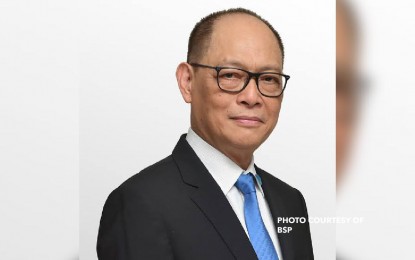
BSP Governor Benjamin Diokno
MANILA – Bangko Sentral ng Pilipinas (BSP) Governor Benjamin Diokno has highlighted the importance of government and private sector coordination to achieve sustainability agenda goals.
In his speech during the Stratbase ADR Institute for Strategic and International Studies (ADR) Pilipinas Conference 2021 on Wednesday, Diokno said sustainability has attracted a global audience for discussions, with the recent one at the COP26 summit in Glasgow, Scotland.
“BSP milestones and initiatives in promoting sustainability agenda will become more meaningful and produce tangible results if all these are done in partnership with supervised financial institutions, other government agencies, and key stakeholders,” he said.
Diokno said the central bank is leading the push for sustainable finance in the country and actively joins international discussions and initiatives on this.
He said the BSP is firm on ensuring the integration of sustainability principles in the operations of its regulated institutions thus, contributing to the establishment of common standards and harmonizing regulatory expectations as part of the inter-agency Financial Sector Forum (FSF).
Also, the central bank launched in 2019 the Sustainable Central Banking Program, which exemplifies the BSP’s role as enabler, mobilizer, and doer of leading sustainability in the financial system.
Diokno said the Sustainable Central Banking Program is being implemented in line with the BSP’s two-pronged approach namely the capacity building and awareness initiatives and the mainstreaming of sustainable finance through the issuance of related regulations.
He said the BSP has already issued two regulations --the Sustainable Finance Framework issued in April 2020, and the Environment and Social Risk Management Framework issued last October.
Incentives are also being considered to encourage banks to further support the sustainability agenda, he added.
Diokno said monetary authorities are proposing the recognition of sustainable finance as among the allowed forms of compliance to the required credit to the agriculture sector.
“We hope to achieve two things with the passage of bills amending the Agri-Agra Law: first mainstreaming sustainable finance and second, mitigating climate change impact in the agriculture sector,” he said.
Banks are generally non-compliant to the required lending to the agriculture and agrarian reform beneficiaries since these are deemed risky sectors.
Thus, financial institutions have been slapped with millions of pesos worth of fines for this.
Diokno said monetary authorities are committed to guiding the financial system through awareness and capacity building and providing a venue for sustainable finance to grow.
He said the central bank bids to engage all stakeholders, noting that “environmental and social risks are not just business risks but risks that affect everyone and the future generations to come.”
“Lastly, (the BSP aims to) navigate the path toward the post-Covid-19 economy and the Philippine financial system that is more stable, resilient, and inclusive,” he added. (PNA)
